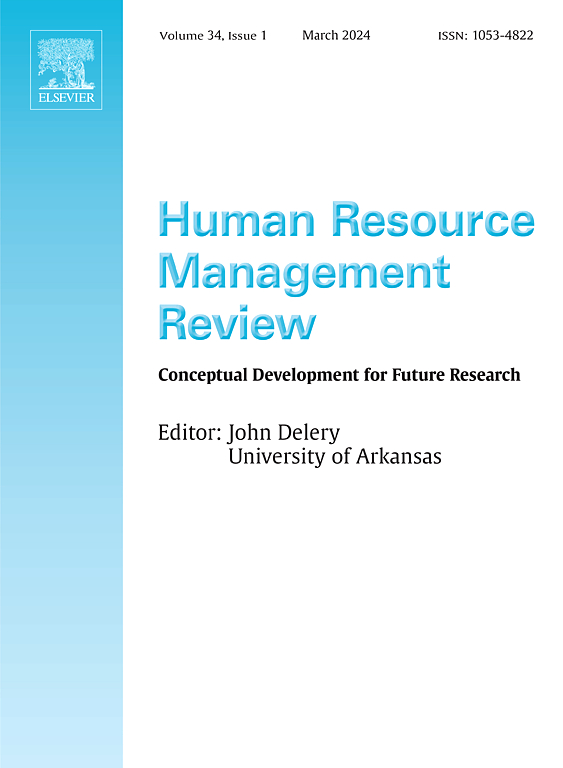Bridging the research-practice gap in modern human resource management
IF 13
1区 管理学
Q1 MANAGEMENT
引用次数: 0
Abstract
As an applied field of management, human resource management (HRM) scholars strive to impact practice, which is still considered a major challenge. This paper focuses on how academic work can be meaningfully integrated with modern HRM practice by showing how rigorous academic work can successfully inform HRM in practice and how scholars and practitioners can co-create rigorous and relevant HRM knowledge. In particular, we illustrate how theoretical insights connected to the shaping, implementation, embeddedness, impact, and effectiveness of HRM practices are helpful in addressing core questions related to progress in a practical way, well-being, and performance at work. In addition, we show how HRM scholars and practitioners can collectively develop knowledge about emerging HRM topics through co-sponsored PhD research. We conclude by reflecting upon the role of academia and practice in bridging the HRM's science-practice gap.
弥合现代人力资源管理研究与实践的差距
人力资源管理作为管理的一个应用领域,其学者努力影响实践,这仍然是一个重大的挑战。本文通过展示严谨的学术工作如何在实践中成功地为人力资源管理提供信息,以及学者和实践者如何共同创造严谨和相关的人力资源管理知识,重点关注学术工作如何与现代人力资源管理实践有意义地结合起来。特别是,我们说明了与人力资源管理实践的形成、实施、嵌入、影响和有效性相关的理论见解如何有助于解决与实际进展、福祉和工作绩效相关的核心问题。此外,我们还展示了人力资源管理学者和实践者如何通过共同赞助的博士研究,共同开发有关新兴人力资源管理主题的知识。最后,我们反思了学术界和实践在弥合人力资源管理科学与实践差距方面的作用。
本文章由计算机程序翻译,如有差异,请以英文原文为准。
求助全文
约1分钟内获得全文
求助全文
来源期刊

Human Resource Management Review
MANAGEMENT-
CiteScore
20.20
自引率
7.00%
发文量
0
审稿时长
48 days
期刊介绍:
The Human Resource Management Review (HRMR) is a quarterly academic journal dedicated to publishing scholarly conceptual and theoretical articles in the field of human resource management and related disciplines such as industrial/organizational psychology, human capital, labor relations, and organizational behavior. HRMR encourages manuscripts that address micro-, macro-, or multi-level phenomena concerning the function and processes of human resource management. The journal publishes articles that offer fresh insights to inspire future theory development and empirical research. Critical evaluations of existing concepts, theories, models, and frameworks are also encouraged, as well as quantitative meta-analytical reviews that contribute to conceptual and theoretical understanding.
Subject areas appropriate for HRMR include (but are not limited to) Strategic Human Resource Management, International Human Resource Management, the nature and role of the human resource function in organizations, any specific Human Resource function or activity (e.g., Job Analysis, Job Design, Workforce Planning, Recruitment, Selection and Placement, Performance and Talent Management, Reward Systems, Training, Development, Careers, Safety and Health, Diversity, Fairness, Discrimination, Employment Law, Employee Relations, Labor Relations, Workforce Metrics, HR Analytics, HRM and Technology, Social issues and HRM, Separation and Retention), topics that influence or are influenced by human resource management activities (e.g., Climate, Culture, Change, Leadership and Power, Groups and Teams, Employee Attitudes and Behavior, Individual, team, and/or Organizational Performance), and HRM Research Methods.
 求助内容:
求助内容: 应助结果提醒方式:
应助结果提醒方式:


